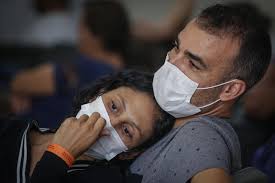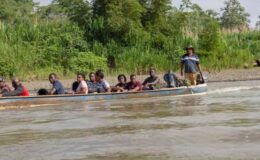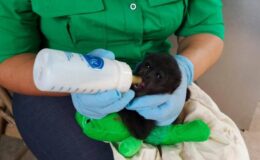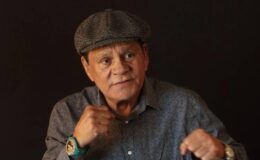Update on US citizens riding out Corona in Latin America.
- By : Panama Now
- Category : Health, Human Interest

LAGO DE ATITLAN, Guatemala (Reuters) – Some Americans, from young backpackers to retirees, are hunkering down for the coronavirus pandemic far from home in Latin America, saying they feel safer and see no point in scrambling to return.
While thousands of Americans sought help from the government or private security firms to evacuate, others chose to stay, worried about what they see as a skyrocketing U.S. caseload made worse by laxer containment measures.
Some seem delighted with their choice, while others are saddened at the prospect of prolonged estrangement from loved ones or are gripped by indecision over where they should go.
With fewer international flights available each day, fast-changing circumstances are helping to write the narrative.
Lola Daehler, a 22-year-old New York native, was traveling with friends in Hawaii as the viral outbreak worsened, provoking sudden travel restrictions. She ultimately opted for the normally tourist-clogged shores of Guatemala’s Atitlan lake, ringed by lush volcanoes and quaint Maya villages.
“I’m very happy I got to the lake,” she said. “I get to wake up and swim and not be in New York City, which seems pretty terrible right now.”
ADVERTISEMENT
America’s biggest city and New York state have become the pandemic’s epicenter in the United States as local officials plead for reinforcements, with 83,712 infections and 1,941 deaths.
Daehler points to Guatemala’s strictly-enforced 4:00 p.m. curfew, enacted over a week ago and announced each day over loudspeakers attached to roving police patrols in the Maya Tz’utujil language, as well as Spanish and English.
Passing the time strumming her guitar, reading, running and swimming, she admits that some friends have implored her to return home.
“It’s not going to happen,” she said.
Guatemalan authorities have confirmed only 39 coronavirus cases and one death to date. However, less than 600 tests have been administered, according to health authorities.
An estimated 9 million Americans live overseas, according to an 2015 estimate from U.S. Department of State, but it is not clear how many are in Latin America as a whole.Backpacker and Spanish language student Lola Daehler, from the U.S., jumps into the water as she decides to stay in Guatemala where feels safer to confront the outbreak of coronavirus disease (COVID-19), in San Pedro La Laguna, Solola, Guatemala March 27, 2020. REUTERS/Luis Echeverria
In Mexico, home to Latin America’s largest population of U.S. citizens, U.S. Ambassador to Mexico Christopher Landau issued a plea for Americans to go home, asking those who stay to “think long and hard about your personal situation.”
He encouraged the estimated 1.5 million American residents to register on an online system for alerts so they can be tracked in Mexico, along whose border U.S. President Donald Trump has pushed for the construction of a wall to stop illegal immigration.
An embassy spokesman would not disclose how many have signed up.
For the past decade, ex-Oregon resident Tina Rosa, a 76-year-old author and folk art enthusiast, has lived near the picturesque Mexican town of San Miguel de Allende.
“I think I’ve already cast my lot here,” she said by phone.
Last weekend, Rosa ventured out for the first time in 10 days – with a face mask and gloves, she said – to buy additional fencing to expand her garden.
“I think people who can actually grow some food are going to be better off than people who can’t,” she said.
While she expects a prolonged quarantine, and overwhelmed health systems everywhere, those are not her top concerns.
“Will I ever get to go back and see my friends again? Will I ever see my daughter again?” she said, her voice shaking with emotion.
NOT FREAKING OUT
Other Americans south of the border describe painfully difficult dilemmas, some of which remain unresolved.
Rosa’s daughter Felisa Rogers, a 41-year-old travel and food writer, is hunkered down in central Mexico City, along with her Mexican boyfriend.
Since late November she has been in Mexico, a frequent travel destination, but has a flight booked back to Oregon on April 5, where she would have more outdoors access compared with the still-crowded sidewalks of her current neighborhood.
“I suppose it’s possible that they’ll cancel my flight. I almost hope they do,” she wrote in an email, noting that she did not want to be cut off from her mother.Slideshow (6 Images)
While viewing the U.S. outbreak as much worse than Mexico’s, Rogers doubted that Mexico was adequately prepared.
To cope, she is cooking, blogging, as well as holding virtual dinner parties and happy hours with friends.
Potential doomsday scenarios do not consume her.
“There doesn’t seem to be any point to freaking out about it,” she said. “I guess I’m trying to save my extreme emotional response for when I lose a loved one, or run out of money.”
Connecticut native Sam Berkrot, a 23-year-old English teacher who moved to Ecuador in September, only recently made up his mind to ride out the pandemic in the small city of Loja where curfew starts at 2:00 p.m.
The teaching contract lasts to at least July, and his window to return to the United States closed about two weeks ago, he said by phone, explaining that he felt safer staying put.
Ecuador’s strict containment measures, including required face masks, are necessary and seem to be working, he said.
“I’m here by my window right now and I haven’t seen a car pass for hours,” he said.
Forced downtime has made him more reliant on online socializing.
“I’ve been Facetiming and calling a lot of my friends back home and spending the night, just like hanging out, pretending to be in their living room,” he said, laughing. “I did that last night and the night before actually.”
Reporting by Milton Castillo in Lago de Atitlan and David Alire Garcia in Mexico City; Additional reporting by Sofia Menchu in Guatemala City; Writing by David Alire Garcia. Editing by Daniel Flynn and Diane CraftOur Standards:The Thomson Reuters Trust Principles.



No Comments